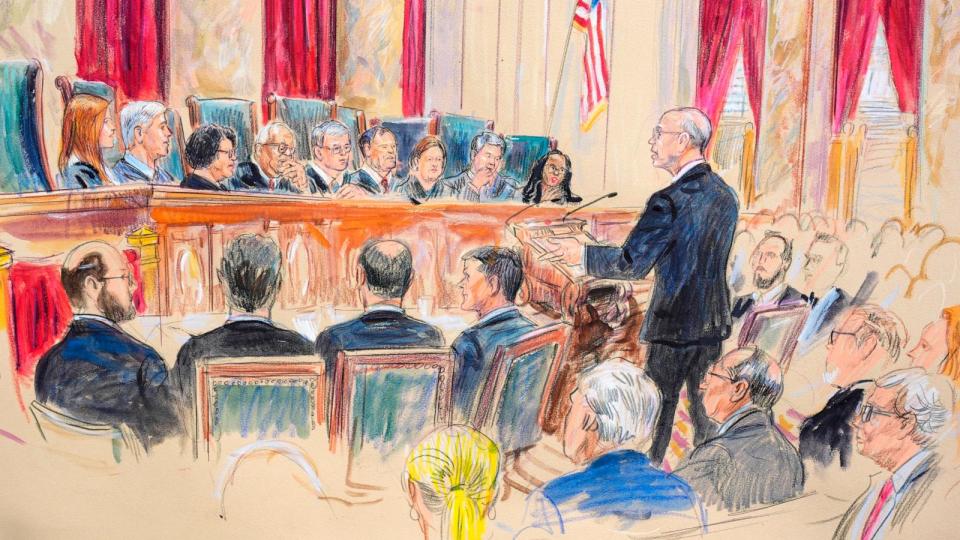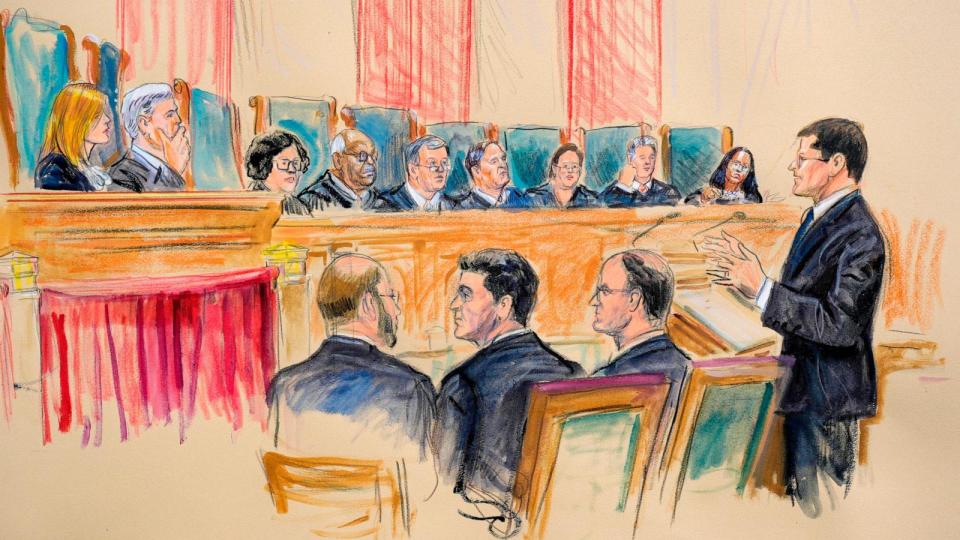Legal experts react to Supreme Court arguments on Trump’s immunity request

When Donald Trump began claiming presidential immunity from criminal prosecution related to his efforts to overturn his 2020 election defeat, many legal analysts ABC News spoke with considered the argument weak.
But last week, during nearly three hours of oral arguments, several Supreme Court justices appeared open to some limited protection of former presidents from criminal liability for official acts they performed while in office. to the White House.
It was a shocking turn of events, according to some veteran court observers.
“It was surprising to hear, at least from some judges, the possibility that a president could somehow commit criminal misconduct for which he could never be held accountable in a court of law ” said Michael Gerhardt, a constitutionalist at the University of North Carolina. told ABC News. “I think this has seemed inconceivable to many people until now.”
MORE: Trump has a good day arguing immunity, but that doesn’t nullify Jan. 6 prosecution: ANALYSIS
“This is exactly what I think most of the American public is going to find quite incredulous,” said David Schultz, a University of Minnesota professor and national expert on constitutional law. “The idea of saying that the president of the United States is above the law compared to the rest of us.”
While the justices appeared poised to reject Trump’s more sweeping assertion of “absolute” immunity, how they attempt to determine which official acts are and are not exempt from criminal prosecution will set a new standard for presidential power .
“This is completely new territory for the court, one that we have never seen before,” Schultz said, “and which will be the subject of major new legislation in the United States.”


The justices grappled with the unprecedented nature of the case during Thursday’s hearing. Justice Neil Gorsuch said what they decide will be a “rule for the ages.”
Even though Trump is the first president to be criminally charged, the arguments were largely devoid of references to the former president and the specific allegations against him.
The issue of immunity came before the Supreme Court in the case brought by special counsel Jack Smith alleging election interference; Trump faces four counts: conspiracy to defraud the United States, conspiracy to obstruct an official proceeding, obstruction and attempted obstruction of an official proceeding, and conspiracy against rights. He has pleaded not guilty and denies any wrongdoing.
Oddly, “in some sense, Trump didn’t seem to be important in this matter,” Schultz said.
Instead, the debate focused largely on hypothetical scenarios, with the justices worrying about the consequences of providing too much or too little protection for future presidents.
“The question quickly became: ‘What is the scope of official conduct?’ “And that’s where, I think, the disagreements between the judges were telling,” Gerhardt said.
At one point, Justice Elena Kagan asked Trump lawyer John Sauer if a president could order the military to stage a coup and be immune. Sauer said that, in their opinion, a president could.
“The response she got was one of the most disturbing I’ve ever heard at the Supreme Court,” Gerhardt said.
Justice Sonia Sotomayor also asked Sauer whether a president could order the military or someone else to kill a political rival, which Sauer said could be considered an official act depending on the circumstances.
“If the possibility of criminal liability is no longer raised, would there not be a significant risk that future presidents will be encouraged to commit crimes with abandon while in office?” » asked Judge Ketanji Brown Jackson.
MORE: Could a president stage a coup? And 9 other key moments from Trump’s Supreme Court immunity hearing
On the other side, several conservative justices seemed primarily concerned about future bad faith lawsuits against former presidents and whether it would hamper their ability to make the “tough decisions” their jobs entail.
Trump’s lawyer also made that point in his opening statement, saying the looming threat of prosecution would “distort the President’s decision-making at precisely the moment when bold and fearless action is most needed.”
Justice Samuel Alito even asked whether, without immunity, presidents would be encouraged to commit crimes in order to stay in power rather than retire peacefully, for fear of being pursued by a “bitter political opponent” after having left their functions.
“Won’t this lead us into a cycle that destabilizes the functioning of our country as a democracy?” » asked Alito.
One expert described Alito’s line of questioning as stepping through the looking glass into an alternate reality.
“The fact that something like this has never happened before is consistent with the government’s position that there are widely enforced institutional standards,” said Ray Brescia, a professor at Albany Law School. “So upsetting that delicate balance because, in the words of Justice Alito, we cannot hold the president responsible for trying to overthrow democracy in fear that a future president might try to overthrow democracy, it “It’s simply Alice in Wonderland.”


However, Stanley Brand, a former House general counsel and now an attorney for several former Trump aides, said he viewed Alito’s question as “timely.”
“What will happen to Joe Biden when he leaves office? Is a Republican Justice Department going to claim that some of the things he did were illegal? So I don’t think that this is a hyperbolic or imaginary concern,” Brand said.
Conservative justices also pointed to controversial conduct by previous presidents, such as Franklin D. Roosevelt’s decision to interfere with Japanese Americans during World War II and John F. Kennedy’s plan to undermine the regime of Fidel Castro in Cuba, and whether they could have been prosecuted.
“Presidents have to do a lot of things that, in retrospect or through the lens of a trial, might not look very good,” Brand said. “You have to look at them carefully, and I think that’s certainly what at least five of the judges are concerned about.”
MORE: 5 takeaways from the Supreme Court’s historic arguments on Trump’s immunity claim
This back-and-forth reflected the difficult path the court faced in developing an opinion.
“The path they took the other day is very complicated and I don’t know how they’re going to come up with a clear answer on that,” Schultz said.
The trial in Trump’s election subversion case was originally scheduled for March 4, but is being delayed as the question of immunity makes its way through the courts. The fact that the Supreme Court agreed to hear Trump’s immunity request and its approach to developing an opinion, which is not expected until June, is widely seen as a victory for the former president, because it makes it less likely than ever that the trial will go ahead. the November elections.
In some high-profile prior opinions involving presidential authority, including U.S. v. Nixon (in which the court held that a president did not enjoy executive privilege with respect to immunity from subpoenas or other civil legal actions) and Clinton v. Jones (who declared that a president had no immunity from civil damages for acts committed before taking office or unrelated to the office), the Supreme Court ruled unanimously.
But experts said that in this case, whatever the court decides, it will likely be divided.
“It’s clear to me that it’s probably going to be a split decision,” Schultz said. “I’ve seen clear divisions and it’s just not good for the court and it’s not good for America in a case as important as this.”
‘Surprising’ and ‘disturbing’: Legal experts react to Supreme Court arguments on Trump’s immunity claim, originally published on abcnews.go.com
yahoo




